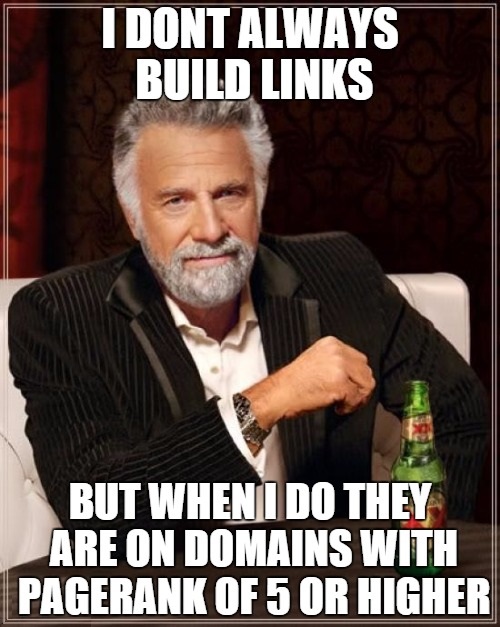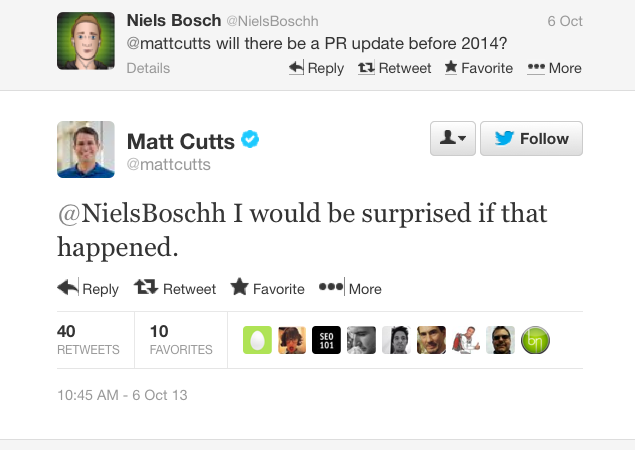Preventing Spammers from Ruling Search Results
One of the main reasons PageRank was shelved is that it became a very effective earmark for spammers to increase their website’s rankings in Google’s search results. As mentioned before, many SEOs would boast the ability to get links on HIGH PR websites. A website with high PR does not necessarily mean it is high quality, as there are several high PageRank websites that are now de-indexed (removed from Google’s search results) because they were abused by spammers for link schemes. Historically, Google has been less and less forthcoming with the data they have at their disposal. “Not Provided” in Google Analytics is one example of this lack of transparency. Google Search Console (formerly Webmaster Tools) also has been limited to only show 30 days worth of clicks, impressions, and other data, as well as only providing a percentage of the link data in their Latest Links and Sample Links exports. Taking all of this into consideration, Google wants less information about how their ranking algorithm works to be available to the public.What is Google’s Opinion about PageRank?
Matt Cutts has several videos about PageRank and the associated Toolbar, but none of them specifically say that PageRank is no longer used. The PageRank toolbar has been shelved for the time being, but PR is still a metric they use in their algorithm to help determine the authority of a website. However, Google’s own John Mueller was asked about the PageRank metric on January 22nd, 2014 in the Google Webmaster Central office-hours hangout and said the following: “I wouldn’t use PageRank or links as a metric. We’ve last updated PageRank more than a year ago (as far as I recall) and have no plans to do further updates. Think about what you want users to do on your site, and consider an appropriate metric for that.” Here’s the video of the Google Webmaster Central office-hours hangout from January 2014: Does this specifically mean that PageRank is dead? No, but the PR toolbar has seen its better days. PageRank is still being utilized in Google’s algorithm, but it should not be used as the only metric when determining the authority or validity of a website. Several other factors have come into play over the past several years such as relevance, quality of content, and many more. Restricting yourself to one or just a few metrics will not provide you with an accurate assessment of a website; only when you use ALL the metrics that are at your disposal will you truly be able to properly analyze a website’s authority.Alternatives to PageRank
One positive aspect of the demise of PageRank as the most interesting metric in the world is the presence of several alternatives to Google’s own outdated ranking system. Several companies in the search engine space have developed their own scoring / ranking systems such as Moz’s MozRank, AHREFS’s Domain Rank, and Majestic’s Trust Flow. Using some (or all) of these alternatives can help webmasters determine the quality of websites using a variety of different scores and algorithms. Do not fall prey to horse-blinders, use all the tools at your disposal to get a leg up on the competition, or hire an SEO expert to help you!WEB ANALYTICS | SEARCH OPTIMIZATION | PAID ADVERTISING | COMPANY NEWS



Oh, I thought Google updates PageRank three or four times in a year? Maybe, if PR is no longer trusted as one of the metrics that determine website score, then maybe I’ll focus on domain authority. Do you think that makes sense?
According to Google, they are no longer updating the PageRank metric (https://www.seroundtable.com/google-next-pagerank-update-19902.html), so for non-Googlers, PageRank is not a reliable metric by which to determine the authority of a website. Domain authority or other metrics made by Moz, Majestic, or other link data sources are pretty reliable when effectively cross-referenced. In the past, PR was updated 3-4 times per year, but it has been pushed to the wayside in recent years as it is an easily gamed metric, and Google has been less and less transparent with the various metrics and keyword / link data since the onset of Penguin in April of 2012.